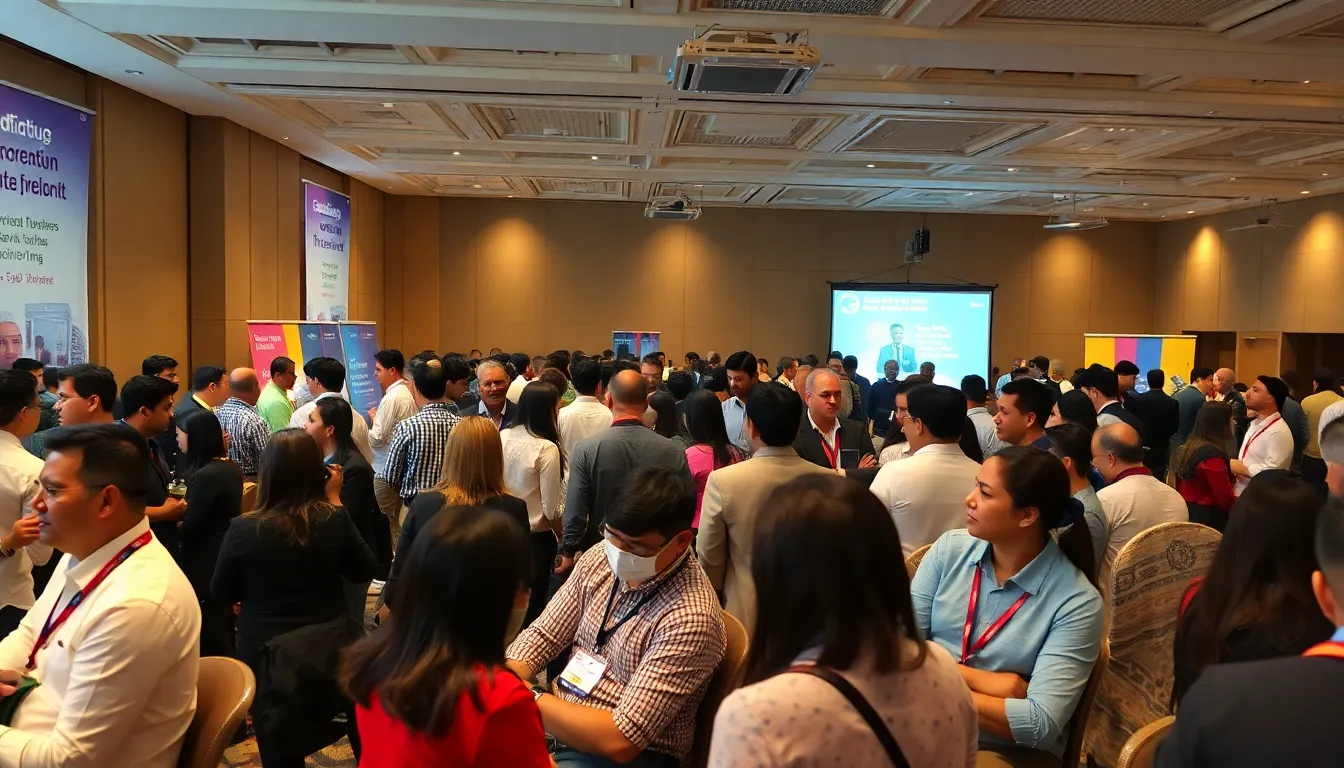Education events are like the secret sauce to success in today’s fast-paced world. They’re not just another reason to leave the comfort of home; they’re opportunities packed with knowledge, networking, and maybe even a few free snacks. Who doesn’t love snacks? Whether it’s a workshop, seminar, or conference, these gatherings bring together bright minds eager to share insights and inspire one another.
Table of Contents
ToggleOverview of Education Events
Education events encompass a wide range of activities aimed at enhancing knowledge and fostering collaboration. Workshops offer hands-on experiences, allowing participants to engage directly with experts. Seminars often involve presentations on specific topics, encouraging discussions among attendees. Conferences bring together professionals from various fields, providing a platform for sharing insights and networking opportunities.
Networking plays a crucial role in these events. Attendees can build valuable connections with like-minded individuals, leading to potential collaborations. The social interactions that occur within these gatherings often facilitate a supportive community atmosphere, helping participants feel more engaged and invested.
Many education events also incorporate interactive sessions. Panel discussions promote diverse viewpoints, sparking thought-provoking conversations. Breakout sessions allow for deeper exploration of subjects, encouraging smaller group dialogues.
Moreover, the appeal of complimentary refreshments can enhance the overall experience. Free snacks and drinks create a welcoming environment, making attendees more comfortable and open to networking.
In recent years, virtual education events have gained traction. Online platforms facilitate participation from anyone, anywhere, breaking down geographical barriers. Hybrid events combine in-person and digital elements, catering to a wider audience and maximizing accessibility.
Overall, education events serve as powerful catalysts for learning and community building. They provide avenues for professional growth and skill enhancement, impacting both personal and career development.
Types of Education Events

Education events vary widely, offering unique opportunities for participants to learn and connect. Here are some key types:
Conferences
Conferences gather large groups of professionals from specific fields. These events facilitate knowledge sharing through keynote speeches, panel discussions, and networking sessions. Participants benefit from insights provided by industry leaders and experts. Attendees can explore a variety of topics, fostering an environment for collaboration and idea exchange. Typically lasting several days, conferences often include breakout sessions that delve into niche subjects. Networking opportunities abound, allowing individuals to create valuable connections and partnerships for future endeavors.
Workshops
Workshops focus on hands-on learning experiences. Facilitators guide participants through practical activities, ensuring skill development in specific areas. Attendees actively engage in exercises that reinforce theoretical concepts. These smaller, interactive settings promote collaboration, enabling participants to learn from each other. Whether developing new strategies or refining existing skills, workshops often encourage discussion and feedback. Overall, workshops provide a supportive environment for personal and professional growth.
Webinars
Webinars offer online educational experiences, breaking geographical barriers. These virtual events allow experts to share knowledge via presentations or live Q&A sessions. Participants can easily join from anywhere, making learning accessible to a wider audience. Interactivity remains a crucial element, as attendees engage through chat features or polls. Organizations often utilize webinars for skill training or informative sessions. The flexibility of webinars makes them an attractive option for learners seeking convenience while still fostering engagement.
Importance of Education Events
Education events play a crucial role in the development of individuals and communities. These gatherings foster unique opportunities for collaboration and learning.
Networking Opportunities
Attending education events facilitates networking among peers and industry professionals. Connections made during these gatherings often lead to collaborations and mentorships. Participants can share insights, exchange contacts, and build lasting relationships. Engaging in discussions with like-minded individuals enhances personal and professional growth. Building a professional network opens doors to new opportunities and increases visibility in specific fields. By interacting with diverse individuals, attendees gain different perspectives, enriching their experiences.
Professional Development
Professional development remains a key benefit of participating in education events. Workshops and seminars provide participants with hands-on learning experiences and skill-building exercises. Learning from experts allows attendees to acquire relevant knowledge and stay updated with industry trends. Gradual improvement of competencies directly influences career advancement. Education events also encourage the exploration of new topics and the application of innovative ideas. Continuous learning ensures ongoing success in evolving professional landscapes.
How to Choose the Right Education Event
Choosing the right education event significantly impacts one’s learning experience. Understanding specific needs helps narrow down options.
Define Your Goals
Clarifying objectives sets a clear direction for selecting an event. Identify whether the focus lies on skill development, networking, or exploring new topics. Knowing the desired outcomes also aids in evaluating potential events. For instance, professional growth often calls for workshops while networking benefits from conferences. Setting measurable goals allows tracking progress and value derived from participation.
Research the Event
Investigating details about the event ensures it aligns with personal and professional aspirations. Check the event’s format to determine whether it offers workshops, seminars, or webinars. Review the speakers’ backgrounds and confirm their expertise in relevant fields. Look for past attendee feedback, which provides insights into the overall experience. Additionally, assess logistical factors such as location or virtual accessibility to avoid unnecessary challenges.
Education events serve as vital platforms for growth and connection in an ever-evolving landscape. They not only provide knowledge but also foster a sense of community among participants. By engaging in workshops seminars and conferences individuals can enhance their skills and expand their professional networks.
The rise of virtual formats has made these opportunities more accessible than ever breaking down barriers and allowing for participation from anywhere. As attendees define their goals and choose events that align with their aspirations they unlock the potential for personal and professional development. Embracing these gatherings can lead to meaningful collaborations mentorships and a deeper understanding of industry trends.



